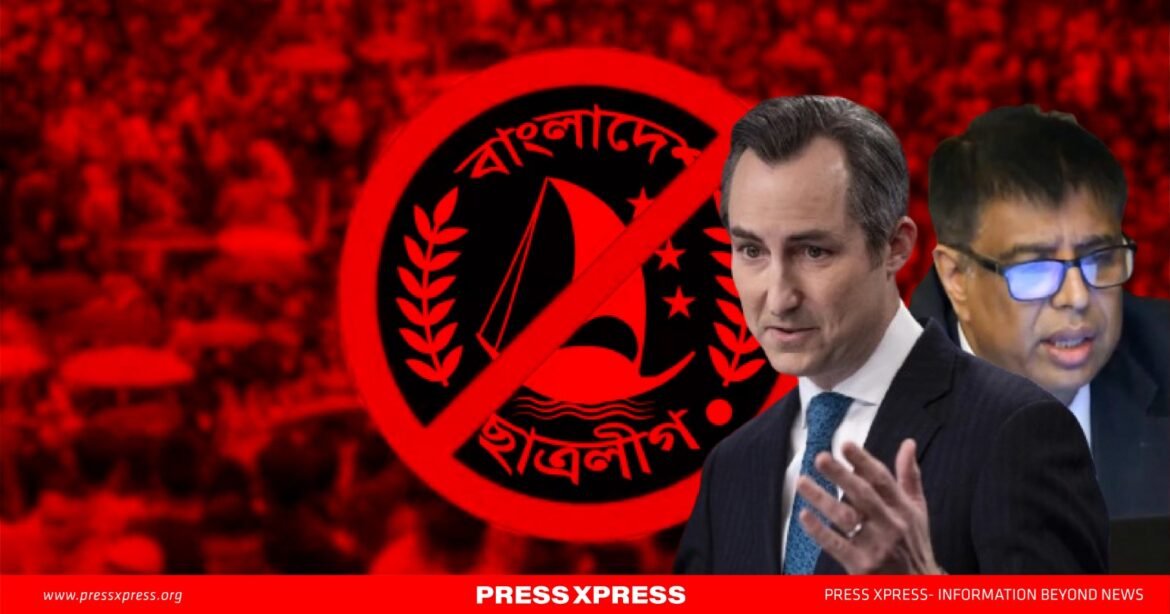The United States has voiced strong support for political freedoms in Bangladesh, particularly the rights to expression and assembly, following the Dr. Yunus-led interim government’s decision to ban the Bangladesh Chhatra League (BCL), the nation’s oldest and largest student organization with deep historical ties to the Awami League.
The ban, enacted on October 23 by the interim government, has sparked debate and widespread dissatisfaction, particularly given BCL’s pivotal role in Bangladesh’s political and historical milestones.
US State Department spokesperson Matthew Miller responded to the decision during a regular press briefing on Monday. Addressing Press Xpress’s USA Bureau Chief Dastagir Jahangir, Miller emphasized the US position on political freedoms.
“We believe that the people of Bangladesh should be able to exercise their fundamental freedoms, including freedom of expression and assembly.
We believe this is the case no matter who the ruling party is in Bangladesh, and we have made that clear numerous times from this podium as well as in our bilateral engagements,” Miller stated.
Founded in 1948, the Bangladesh Chhatra League has stood at the heart of Bangladesh’s transformative political history, leading movements from the 1952 Language Movement to the 1971 Liberation War and post-independence democratic struggles.
The recent ban followed an ultimatum from a faction of the Anti-Discrimination Student Movement, which also demanded the repeal of the nation’s 1972 constitution—a constitution anchored in secular and democratic values, formulated in the immediate aftermath of Bangladesh’s independence from Pakistan.
Since the ouster of Sheikh Hasina on August 5, Bangladesh has witnessed a troubling surge of initiatives aimed at erasing the legacies of the Awami League and the Liberation War. On October 21, protesters aligned with the Anti-Discrimination Student Movement demanded the resignation of President Shahabuddin. Notably, even major political entities such as the Bangladesh Nationalist Party (BNP) opposed the idea of the President’s removal through unconstitutional means. Yet, despite this consensus, protesters marched on the presidential palace, resulting in violent clashes with police forces.
Amidst, hundreds of BCL leaders and activists have been arrested, while their homes and properties are vandalized and looted, nearly 4 million activists and their families are in fear of persecution, many forced into hiding due to life threats.
All university campuses have become hostile grounds, where BCL-affiliated students face harassment and are often blocked from attending classes, jeopardizing their education and future prospects. Families of activists report social and economic exclusion, while authorities turn a blind eye, intensifying fears of prolonged persecution.
With no state protection, the crackdown has sparked serious human rights concerns, as the repression of BCL threatens to undermine the democratic principles at the heart of Bangladesh’s identity.
Meanwhile, a wave of radical Islamist movements has gained momentum, echoing aspirations for governance akin to Afghanistan’s Sharia-based legal framework. Amid this rise, hundreds of sculptures depicting Bangladesh’s founding father, Sheikh Mujibur Rahman, have been defaced, and numerous Hindu temples have come under attack. The interim government’s perceived inaction in curbing these extremist activities has raised serious concerns about the protection of minority communities and national heritage.
With the interim government facing mounting public criticism over soaring commodity prices, escalating security concerns, and rising lawlessness, Bangladesh now stands at a critical juncture, where its historical identity and future direction seem more uncertain than ever.
During the same press briefing, Dastagir Jahangir raised another pressing issue: the reported dismissal of 252 police sub-inspectors, allegedly excluding all Hindu officials. Miller responded by reiterating the United States’ opposition to any form of religious discrimination, emphasizing that such principles are core to US values and must be upheld universally, in Bangladesh and beyond.
The situation underscores growing concerns in Bangladesh about political freedoms, minority rights, and the integrity of the nation’s democratic institutions amidst an increasingly volatile political landscape.


